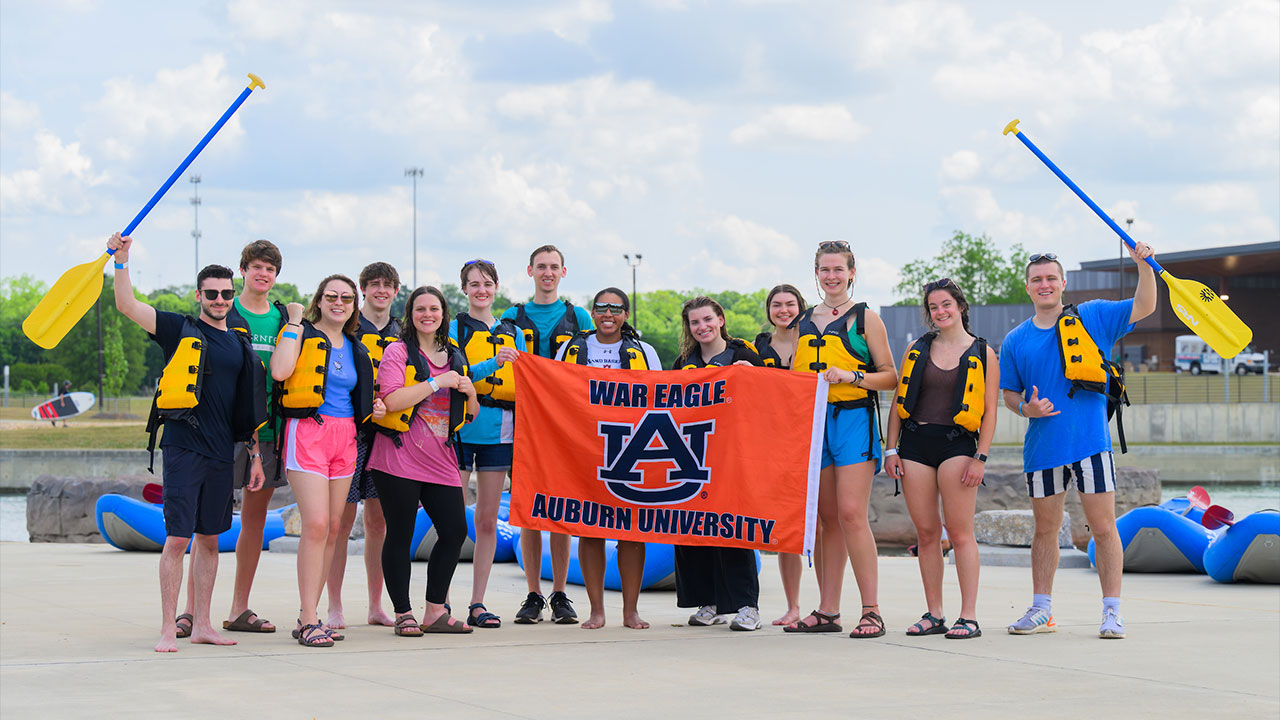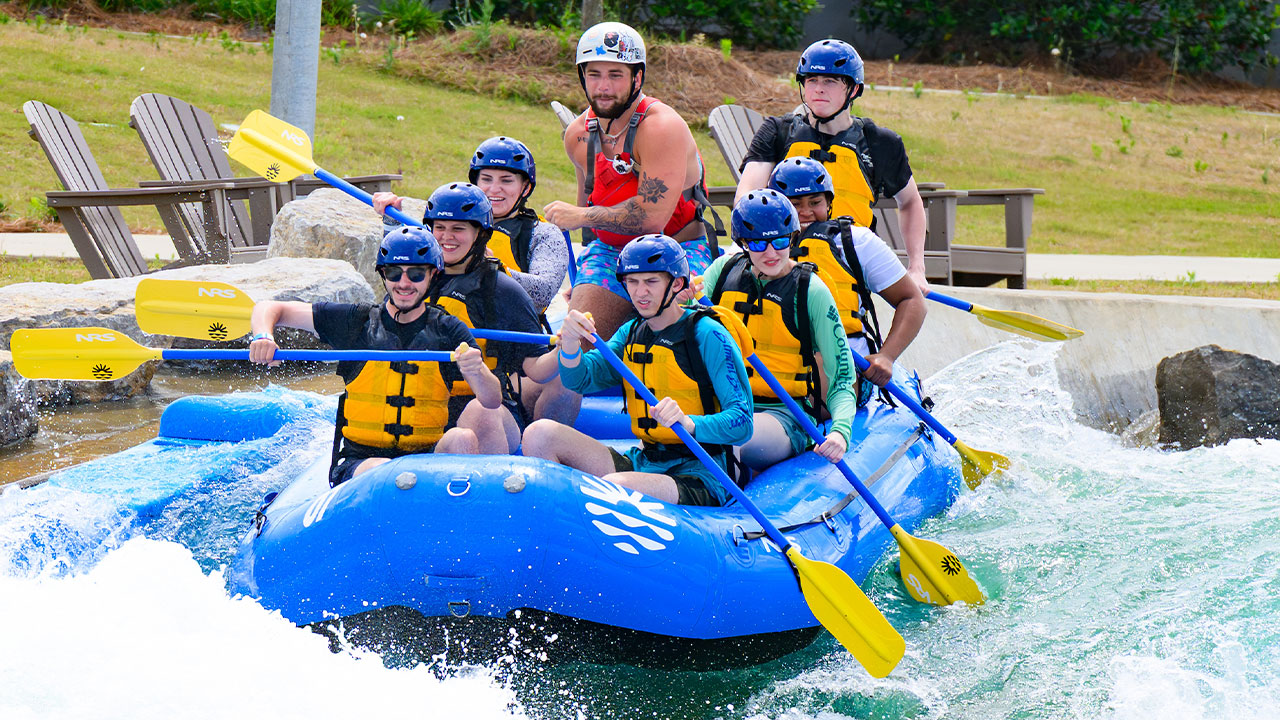content body
To many students, Auburn Outdoors is simply a way to rent a bike, scale a 50-foot climbing wall or experience whitewater rafting.
But beyond that, participation in such activities offers meaningful benefits for health and wellness, especially mental health, even if students don’t realize it.
Brooke Oelking didn’t think about those benefits when she went whitewater rafting or ziplining. She used Auburn Outdoors (AO) to meet new people and enjoy the outdoors.
And yet, the mechanical engineering major admitted that “being in nature helps me rebalance and gives me a sense of calm. Auburn Outdoors is a great resource that all students can benefit from — whether to relax, reset, meet new people or enjoy the outdoors.”
For seniors Jala Baugh and Spencer Graham, the offerings were an escape from schoolwork, but both noticed how participation made them feel.
“I’m usually tired and worn out from pushing my personal limits, but the experience has always been enjoyable,” said Graham, a civil engineering major who has been backpacking, fly fishing and mountain biking, to name a few. “I’m happy to meet new people, and I always leave with a sense of optimism.”
“The trips helped me manage my stress and provide a break from class, while having fun with others in nature,” added Baugh, a speech, language and hearing sciences major. “I always feel refreshed afterward.”
Since her first year on campus, Baugh’s been whitewater rafting twice, ziplining in Georgia, paddleboarding on Lake Martin and skiing in North Carolina, among others.

These students are all smiles because the outdoor activity of whitewater rafting provides a break for the rigors of classes. It's also fun, according to students and Auburn Outdoors staff.
Why it works
Such reactions don’t surprise AO staff or Doug Hankes, the executive director of Student Counseling and Psychological Services.
“As a child, we played without having to be told. As adults, we need to figure out what ‘play’ is for us,” he said. “Almost any physical exercise or movement will benefit us mentally; the difficult part is finding something we enjoy and can consistently engage in.”
Coordinators Robby Hill and Anna Calhoun hope students view outdoor activities not just as fun, but also as a strategy for managing stress.
“Getting outside offers a break from the pressures of classes and life, helping students feel a sense of freedom,” said Calhoun, who manages daily operations of the trip program and climbing wall.
“I have felt how much a single afternoon outdoors can help mental health,” added Hill, who manages the rental center and bike shop. “Getting outside can have a profound impact, and we have the means to help students realize that.”
Trip manager Leah Price said her belief in nature’s benefits was reinforced when she researched the effect of outdoor experiences on human development, and “study after study reinforced this idea. The outdoors is essential to everyone’s development, health and overall wellbeing.”
Removing barriers
Word of mouth mainly drives Auburn Outdoors’ popularity, but the idea of outdoor adventures can be intimidating, particularly for first-timers. Don’t worry, the team aims to eliminate such obstacles and create an inclusive experience.
“Barriers — transportation, cost of gear, lack of experience, fear — can keep students away, but we work to break them down and make adventures accessible to all,” Calhoun said.
Coordinating day trips to nearby spots — like Chewacla State Park or Lake Martin — helps students see that outdoor options are within reach, Price said.
Hill said workshops like “Fix a Flat,” “Backcountry Basics” and “Fundamentals of Climbing” are designed to ease entry into nature.
“I don’t think it is lost on anyone that connecting to the outdoors — and to others through it — is vital to overall wellness,” said Assistant Director Keli Berkman. “It also happens to be really, really fun.”
Graham probably wouldn’t have taken his adventure trips if he had had to plan and organize them himself. Fortunately, AO staff handle all of that. Another barrier down.

Auburn Outdoors and Recreation and Wellness want to see students participate in their offerings because it's good for the mind, body and soul to be active, be with others and be outside.
Forming a community
Auburn Outdoors launched in 2013 with the opening of the Recreation and Wellness Center. Though the COVID-19 pandemic stifled visibility, its student and professional team has helped it rebound.
Oelking said she would have signed up for more trips, but registration often fills fast. Calhoun and Price admitted that many trips are booked within a day.
AO averages seven trips per semester, which Berkman said run at capacity. Between fall 2022 and fall 2024, rentals rose 50% and overall participation increased 17%. Rentals especially surge in pleasant weather.
“On a nice April or September weekend, we’ll have more than 250 or 300 items go out,” Hill said. “Tents, boats, bikes — the shop will be cleared out.”
Although not an outdoor activity to benefit physical and mental health, he noted that tents are also popular for students camping outside Neville Arena for prime access to men’s basketball games.
“Today, Auburn Outdoors is not only an intentional and inclusive space; it’s a vibrant, productive community,” Berkman said. “Our community supports student success through positive outdoor experiences.”








